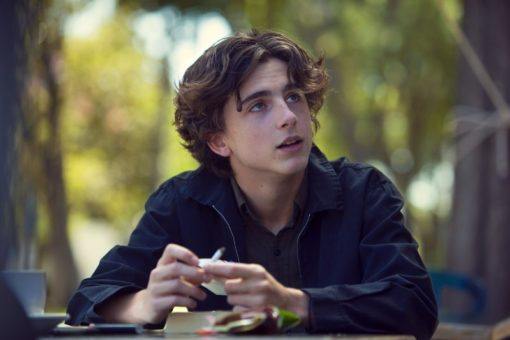
Still from “Lady Bird.”
“It’s my tradition to run for office,” announces the title character in Greta Gerwig’s Lady Bird. “Don’t worry — I won’t win.” In spite of any associations the title might conjure, this acclaimed recent film has nothing to do with Lady Bird Johnson. But it might instead call to mind the political life and legacy of a very different former first lady.
The film follows a pink-haired high school senior with a desire to make history, living out a hardscrabble adolescence in Sacramento in 2002. A significant portion of the plot involves the teenage Lady Bird’s process of articulating her identity through a series of hapless romantic encounters. First, there’s Danny, the gentle and sunny early boyfriend who adores her for who she is, but ultimately turns out to be gay. Then, after Danny, there’s Kyle. Lady Bird first falls for him when she sees him performing with his band, his tousled hair hiding his eyes, and we know from the get-go that he’s going to be an epic boor. He’s sullen and self-obsessed. He doesn’t get her quirky style. He corrects her pronunciation, and, when she tells him she doesn’t have a cell phone, he responds with the patronizing affirmation, “Good girl.” Kyle says he’s a virgin, even though he isn’t, and when Lady Bird calls him on out it after they have sex, he entirely dismisses her outrage. “You’re deciding to be upset,” he scolds her, before evoking the Iraq War’s high civilian death toll to encourage her to put her suffering in perspective.
Yes, there’s one other thing about Kyle: he’s a leftist, parodically depicted. He reads Howard Zinn in church. His version of a compliment is to tell Lady Bird she’s “very anarchist.” He rails against state surveillance and industrially produced cigarettes, and he announces that he’s “trying to, as much as possible, not participate in our economy.” In short, he’s a “Bernie Bro,” the archetypical callous leftist invoked by Clinton allies during the 2016 Democratic primary. And Lady Bird, in her efforts to impress Kyle and his jaded friends, tries very hard to become something she is not. As soon as she takes an interest in Kyle, we see her sitting with her own newly acquired copy of A People’s History. We hear her call a nun a “cunt.” “She thinks she’s too cool for theater,” says her now-discarded dorky friend, after Lady Bird blows off play practice to vandalize a car. It all brings to mind Gloria Steinem’s infamous gloss on why more young women weren’t gravitating toward Clinton in the primary: “when you’re young, you’re thinking, where are the boys? The boys are with Bernie….”
So what are Lady Bird’s actual politics, separate and apart from her attempts to conform to Kyle’s standards? Left to her own devices, the film takes pains to assure us, Lady Bird is no stranger to a vague progressive agenda. When her friend expresses concerns about applying to colleges in New York, citing the possibility of another terror attack, Lady Bird responds, “Don’t be a Republican.” When Lady Bird spots a Reagan poster hanging on the wall in the opulent home of Danny’s rich grandmother, she sneers. She embraces Danny when he subsequently comes out to her as gay, assuring him she’ll stand by him as he figures out how to tell his family. And when her high school corrals all the girls into an anti-choice assembly featuring a moralizing guest speaker, Lady Bird is the one who disrupts the program, interjecting a defense of abortion and unapologetically dropping the word “vagina” in front of the whole school, like the minor badass that she is.
But these tepid markers of being Not A Republican — this is where her political engagement stops short. In one particularly telling scene, Lady Bird receives a rejection letter from UC Berkeley, the alma mater of her older brother Miguel. Lady Bird reacts to the slight by insinuating that she was disadvantaged by being white; Miguel, she suggests, was only offered admission because he is a person of color. “You fucking racist,” he yells back at her, in a scene that is presented as a harmless adolescent squabble. Later in the film, when Kyle picks up Lady Bird on prom night and refuses to come to the door and escort her to the car, Miguel is disgusted on Lady Bird’s behalf. “Even you deserve better than this,” he says to her. In this film’s grand hierarchy of sins, honking in the street for one’s girlfriend is definitely worse than carrying the torch of institutionalized racism.
And so Lady Bird arrived in 2017 to excuse white outrage and reinscribe the idea that leftist thinking is a phase of adolescence, a dalliance for the self-possessed woman on the way to growing up and getting real. In the world of Lady Bird, politics isn’t any matter of life and death, but instead a kind of personal style. It’s like a prom dress or a music collection — everyone’s got her own, and the trick is simply to find the one that fits you. That the film has been so well received speaks to how eager audiences are for validation of centrist inclinations and allegiances, and for permission to tune out criticism from the left. Greta Gerwig recently announced her intention to make several other films set in this same so-called universe. As the saying goes — give the people what they want.